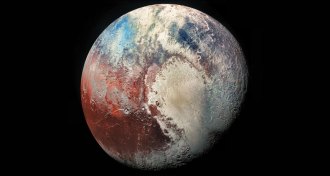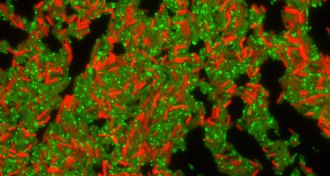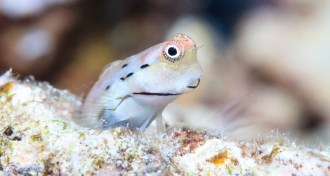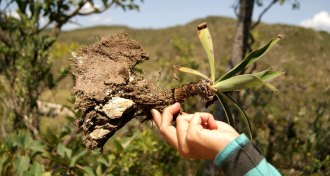News
-
 Planetary Science
Planetary ScienceIcy volcanoes on Pluto may have spewed organic-rich water
Planetary scientists found ammonia-rich ice near cracks on Pluto, suggesting the dwarf planet had recent icy volcanoes.
-
 Physics
PhysicsIn a first, scientists took the temperature of a sonic black hole
A lab-made black hole that traps sound, not light, emits radiation at a certain temperature, as Stephen Hawking first predicted.
-
 Physics
Physics100 years ago, an eclipse proved Einstein right. Today, black holes do too — for now
In 1919, an eclipse affirmed Einstein’s famous general theory of relativity. Now scientists hope to use black holes to poke holes in that idea.
-
 Physics
PhysicsA new optical atomic clock’s heart is as small as a coffee bean
Optical atomic clocks are extremely good at keeping time, and they’re on their way to becoming pocket watches.
-
 Life
LifeHow bacteria nearly killed by antibiotics can recover — and gain resistance
A pump protein can keep bacteria alive long enough for the microbes to develop antibiotic resistance.
-
 Animals
AnimalsShy fish no bigger than a pinkie provide much of the food in coral reefs
More than half of the fish flesh that predators in coral reefs eat comes from tiny, hard-to-spot species.
By Susan Milius -
 Math
MathMathematicians report possible progress on proving the Riemann hypothesis
A new study advances one strategy in the quest to solve the notoriously difficult problem, which is still stumping researchers after 160 years.
-
 Health & Medicine
Health & MedicineBeing bilingual is great. But it may not boost some brain functions
A large study of U.S. bilingual children didn’t turn up obvious benefits in abilities to ignore distractions or switch quickly between tasks.
-
 Physics
PhysicsBig black holes can settle in the outskirts of small galaxies
Astronomers have found dozens of surprisingly massive black holes far from the centers of their host dwarf galaxies.
-
 Health & Medicine
Health & MedicineFaulty cellular antennae may cause a heart valve disorder
Mitral valve prolapse might be caused by dysfunctional primary cilia meant to signal cells during development.
-
 Environment
EnvironmentEmissions of a banned ozone-destroying chemical have been traced to China
Since 2013, eastern China has increased its annual emissions of a banned chlorofluorocarbon by about 7,000 metric tons, a study finds.
-
 Plants
PlantsSome plants use hairy roots and acid to access nutrients in rock
Shrubs in mountainous areas of Brazil have specialized roots that secrete chemicals to extract phosphorus from rock.
By Yao-Hua Law